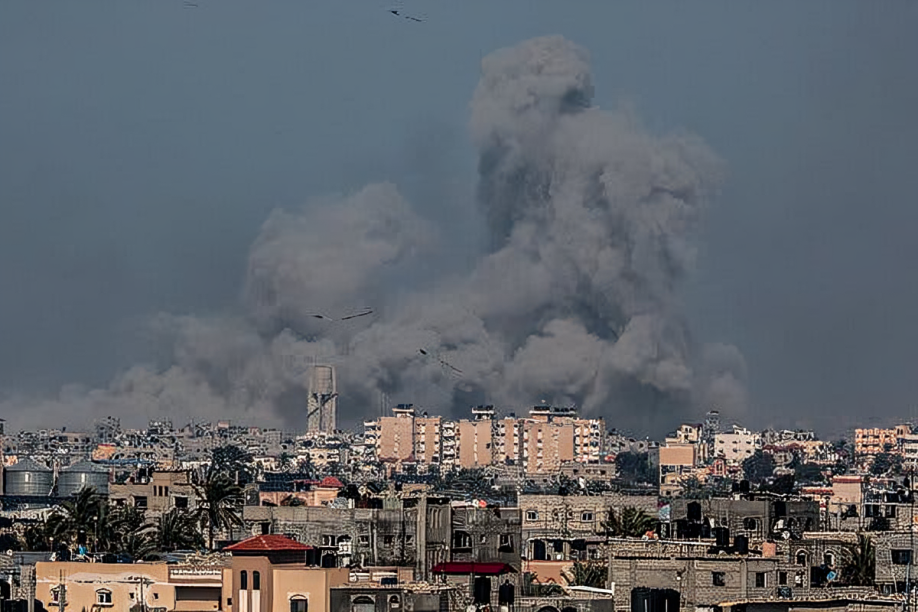Israel-Hamas War: US vetoes United Nations resolution on Gaza ceasefire for the third time
The United States said the resolution could have disrupted its negotiations to free hostages and secure a temporary cease-fire, but its vote drew outcry from many diplomats and aid workers

sraeli bombardment in the southern Gaza Strip on Tuesday.Credit...Said Khatib/Agence France-Presse (Image Source: NY Times Report)
The Israel-Palestine conflict is a long-standing and complex dispute with deep historical roots. It primarily revolves around the question of land and sovereignty in the region known as Palestine before the establishment of the State of Israel in 1948. The conflict has been marked by periods of armed conflict, political tension, and failed peace processes.
The recent events at the United Nations Security Council reflect the ongoing international debate over how to address the conflict. The U.S. veto against the resolution calling for an immediate cease-fire in Gaza highlights the challenges of diplomatic efforts in the region. The U.S. has historically been a strong ally of Israel, and its vetoes have often been seen as a way to protect Israeli interests. The situation is further complicated by the humanitarian concerns in Gaza, where the population is facing severe hardships.
It was the third time Washington wielded its veto to block a resolution demanding a stop to fighting in Gaza, underlining America’s isolation in its continued, forceful backing of Israel. Over four months of war, Israel has come under increasing international pressure over the scope and intensity of its campaign against Hamas in Gaza, with many leaders decrying the high civilian death toll.

Algeria’s U.N. ambassador, Amar Bendjama, lashed out at the United States on Tuesday, telling the Council that the veto “implies an endorsement of the brutal violence and collective punishment inflicted upon” the Palestinians. He said “silence is not a viable option, now is the time for action and the time for truth.” The diplomatic maneuvering comes at a time when aid organizations are warning that urgent assistance is needed for a population suffering from severe malnutrition and the spread of infectious disease.
Thirteen Security Council members voted in favor of the resolution, which was drafted by Algeria, while Britain abstained. For a UN Security Council resolution to be adopted, at least nine votes in favor are required, with no vetoes from any of the five permanent members: the US, UK, France, Russia, or China.
The resolution drafted by Algeria and the subsequent veto by the U.S. underscore the divisions within the international community on how to proceed. While the majority of the Security Council members supported the resolution, the U.S. argued that it could disrupt ongoing negotiations for a cease-fire tied to the release of hostages. The UK’s abstention also indicates the complexity of the issue and the varying positions of different countries.
The conflict between Israel and Hamas militants, which began with attacks on October 7, has led to casualties and hostages, drawing international attention and condemnation. The UN General Assembly’s call for an immediate humanitarian ceasefire reflects the global concern for the situation.
The use of the veto power by permanent members of the Security Council, such as the U.S., has been a point of contention, with some countries arguing that it hinders the ability to reach a consensus and take action to alleviate suffering in conflict zones like Gaza.
In summary, the Israel-Palestine conflict remains one of the most challenging issues for the international community to address, with recent events at the UN highlighting the ongoing debates and diplomatic efforts to find a resolution. The humanitarian situation in Gaza continues to be a major concern, and the world watches closely as efforts to negotiate a cease-fire and provide aid to the affected population continue.
Team Profile

- News Writer
- Shubham Chakraborty, a Freelance Writer, holds an MBA from XLRI and boasts 6.5 years of extensive corporate experience. Departing from his corporate path, he embarked on a journey to fulfill his childhood dream of focusing on writing.
Latest entries
 English12 May 2024US Likely to Impose 100% Tariff on Electric Vehicle Imports from China
English12 May 2024US Likely to Impose 100% Tariff on Electric Vehicle Imports from China English26 March 2024UN Security Council Demands Immediate Ceasefire for the First Time Amidst Ongoing Israel-Gaza Conflict
English26 March 2024UN Security Council Demands Immediate Ceasefire for the First Time Amidst Ongoing Israel-Gaza Conflict English23 March 2024Bloodbath in Moscow: ISIS-K Delivers Shocking Blow to Heart of Russia
English23 March 2024Bloodbath in Moscow: ISIS-K Delivers Shocking Blow to Heart of Russia English20 March 2024A Hollow Victory: Putin Claims Landslide in Russian Election and Scorns US Democracy
English20 March 2024A Hollow Victory: Putin Claims Landslide in Russian Election and Scorns US Democracy





